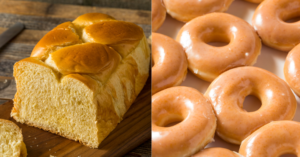The Secret To Making The Perfect Gluten-free Bread: What Is Chickpea Flour?
What To Know
- It has a nutty flavor, a golden-yellow color, and a slightly gritty texture.
- Chickpea flour is a staple ingredient in many cuisines worldwide, particularly in South Asia and the Mediterranean region.
- Store chickpea flour in an airtight container in a cool, dry place.
Chickpea flour, also known as besan or gram flour, is a gluten-free flour made from finely ground chickpeas. It has a nutty flavor, a golden-yellow color, and a slightly gritty texture. Chickpea flour is a staple ingredient in many cuisines worldwide, particularly in South Asia and the Mediterranean region.
Nutritional Profile
Chickpea flour is an excellent source of several essential nutrients, including:
- Protein: High in protein, making it a great plant-based alternative for vegetarians and vegans.
- Fiber: Rich in insoluble and soluble fiber, which supports digestive health and promotes satiety.
- Iron: A good source of iron, which is essential for red blood cell production and oxygen transport.
- Magnesium: Contains magnesium, which supports muscle function, nerve transmission, and bone health.
- Potassium: Rich in potassium, which helps regulate blood pressure and fluid balance.
Culinary Applications
Chickpea flour has a wide range of culinary applications:
- Baking: Used as a gluten-free alternative in breads, cakes, cookies, and muffins.
- Frying: As a batter for pakoras, falafel, and other fried snacks.
- Thickening: A natural thickener for soups, stews, and sauces.
- Pancakes and Waffles: A base ingredient for gluten-free pancakes and waffles.
- Indian Cuisine: A key ingredient in many Indian dishes, such as chana masala, kadhi, and pakoras.
- Mediterranean Cuisine: Used in Mediterranean dishes like hummus, falafel, and shakshuka.
Health Benefits
In addition to its nutritional value, chickpea flour offers potential health benefits:
- Supports Heart Health: The fiber and potassium in chickpea flour may help lower cholesterol levels and reduce the risk of heart disease.
- Aids Digestion: The fiber content promotes regular bowel movements and supports a healthy digestive system.
- May Reduce Blood Sugar Levels: The fiber in chickpea flour can slow down the absorption of sugar, helping to regulate blood sugar levels.
- Supports Weight Management: The high fiber and protein content of chickpea flour can promote satiety and reduce calorie intake.
How to Use Chickpea Flour
- As a gluten-free flour: Substitute chickpea flour for wheat flour in baking recipes.
- As a thickener: Add chickpea flour to soups, stews, and sauces to thicken them.
- As a frying batter: Mix chickpea flour with water or other liquids to create a crispy batter for frying.
- As a pancake or waffle base: Combine chickpea flour with other ingredients to create gluten-free pancakes or waffles.
- As a base for Indian dishes: Use chickpea flour to make a variety of Indian dishes, such as chana masala and pakoras.
Storage and Shelf Life
Store chickpea flour in an airtight container in a cool, dry place. It can last for several months if properly stored.
The Bottom Line: Embracing the Versatility of Chickpea Flour
Chickpea flour is a nutritious and versatile ingredient that can enhance your culinary creations. Its gluten-free nature, health benefits, and wide range of applications make it a valuable addition to any kitchen. From baking to frying to thickening, chickpea flour offers endless possibilities for culinary exploration.
Information You Need to Know
1. Is chickpea flour the same as besan?
Yes, chickpea flour and besan are the same.
2. Is chickpea flour keto-friendly?
No, chickpea flour is not keto-friendly due to its high carbohydrate content.
3. Can I use chickpea flour to make pasta?
Yes, you can use chickpea flour to make gluten-free pasta.
4. Is chickpea flour good for weight loss?
Yes, chickpea flour can support weight loss due to its high fiber and protein content.
5. Does chickpea flour raise blood sugar levels?
Chickpea flour has a moderate glycemic index, so it may not significantly raise blood sugar levels.
6. Can I use chickpea flour to make bread?
Yes, you can use chickpea flour as a gluten-free alternative in bread recipes.
7. Is chickpea flour safe for people with celiac disease?
Yes, chickpea flour is gluten-free and safe for people with celiac disease.
8. Can I substitute chickpea flour for almond flour?
Yes, you can substitute chickpea flour for almond flour in some recipes, but the texture and flavor may vary.
9. Is chickpea flour a good source of calcium?
No, chickpea flour is not a good source of calcium.
10. Does chickpea flour expire?
Yes, chickpea flour can expire if not properly stored.
